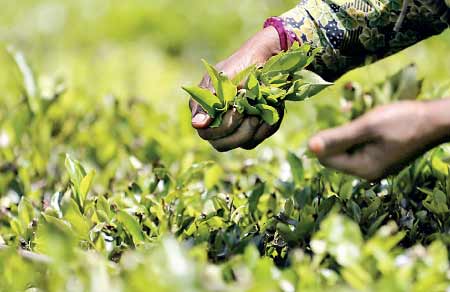Monday Feb 16, 2026
Monday Feb 16, 2026
Thursday, 11 July 2024 02:49 - - {{hitsCtrl.values.hits}}
 The Government has taken a decisive move to expedite the imposition of necessary laws to cancel land lease agreements with Regional Plantation Companies (RPCs) that have failed to pay the stipulated wages to estate workers despite having the capacity to do so.
The Government has taken a decisive move to expedite the imposition of necessary laws to cancel land lease agreements with Regional Plantation Companies (RPCs) that have failed to pay the stipulated wages to estate workers despite having the capacity to do so.
The decision follows the recommendations of an appointed committee tasked with confirming each company’s financial capability to meet the wage requirements.
On 22 May, the Finance, Economic Stabilisation and National Policies Ministry was instructed to estimate the appropriate daily wage for estate workers, to ensure that wages are in line with the current economic realities faced by labourers.
By holding plantation companies accountable, the Government aims to protect the livelihood of estate workers and ensure fair compensation.
It was also decided at the meeting of the Cabinet of Ministers to appoint a committee to confirm the capability of each regional estate companies to pay the said wages. “It was also decided to accelerate the process of imposing necessary laws to cancel the land lease agreements with the Government which the regional plantation companies who refrained from paying the precise salary entered into even with the capability to pay based on the recommendations of the aforesaid committee,” a Government statement said.
The Government intervention comes after the Supreme Court last week issued an interim injunction preventing the implementation of a Gazette notification by the Labour Minister that sought to increase the daily wage of plantation workers to Rs. 1,700, up by 70%. The order came as a result of an appeal petition filed by several plantation companies, including Agarapathana Plantations Ltd., challenging the legality of the wage hike mandated by the Government.
The Court’s decision was delivered by a three-member bench consisting of Justices Gamini Amarasekara, Kumuduni Wickramasinghe and Janak de Silva.
The petition was filed by 21 plantation companies, arguing that the decision by Labour Minister Manusha Nanayakkara to increase wages was made without proper consultation and thus violated the legal principle of natural justice.
The contentious Gazette Extraordinary No. 2381/35, issued on 25 April, had set the daily wage at Rs. 1,350 with an additional Rs. 350 to total Rs. 1,700, plus Rs. 80 for each extra kilo plucked.
Several Ministers have openly threatened to take over the estates managed by RPCs that do not pay the increased wage.
The interim order will be in effect till the conclusion of the hearing of the petition. The Court has scheduled the next hearing for 28 August.
 Plantation industry sources yesterday warned that the increased wage will affect the entire tea, rubber, and oil palm industries, impacting companies, smallholders, and private factories alike.
Plantation industry sources yesterday warned that the increased wage will affect the entire tea, rubber, and oil palm industries, impacting companies, smallholders, and private factories alike.
“This will also impact exports and the Ceylon Tea brand due to reduced crop yield and quality, similar to past bans on glyphosate and fertilisers which resulted in prolonged crop recovery,” they added.
The total additional fixed wage cost is estimated at Rs. 81 billion, exceeding the entire industry’s cash flow, industry sources warned.
“Sri Lanka already faces the highest production costs, wages, and lowest productivity among global tea producers. Notably, the new mandated wage is double that of India, creating significant cost discrepancies in the international market,” they pointed out.
There are approximately 500,000 tea smallholders predominantly in the Southern Province and Sabaragamuwa, employing external labour for leaf harvesting at Rs. 40 per kg. Under the new wage order, they will need to pay Rs. 80 per kg without an increase in revenue. Private tea factories will collectively face an additional labour cost of Rs. 12 billion.
“The focus should shift towards ensuring a minimum income of Rs. 1,700 rather than a fixed minimum wage of Rs. 1,700,” suggests industry experts. “Increasing the fixed wage reduces the incentive for increased leaf plucking, leading to reduced total revenues alongside significantly heightened costs, potentially more damaging to the industry than the glyphosate and fertiliser bans,” they added.
It was emphasised that sustainable growth requires growers to maintain cash flow to secure employment for their workers. Elevating the fixed wage without accounting for productivity to offset the added costs is detrimental.
The rise in fixed wages will escalate tea production costs to Rs. 1450 per kg, surpassing the average auction sale price of Rs. 1250 per kg. “This substantial gross loss poses severe financial challenges to the industry’s sustainability. With heavy borrowings already in place, a failure to manage this mandated increase will adversely impact the financial sector as well,” warned industry experts.